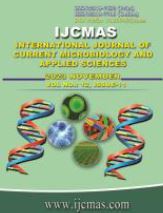


 National Academy of Agricultural Sciences (NAAS)
National Academy of Agricultural Sciences (NAAS)

|
PRINT ISSN : 2319-7692
Online ISSN : 2319-7706 Issues : 12 per year Publisher : Excellent Publishers Email : editorijcmas@gmail.com / submit@ijcmas.com Editor-in-chief: Dr.M.Prakash Index Copernicus ICV 2018: 95.39 NAAS RATING 2020: 5.38 |
The dependence on chemical fertilizers for meeting plant nutrient needs has precipitated declines in soil health and microbial diversity degradation. Enhanced soil health and diverse rhizosphere microbial populations are said to contribute for sustainable agricultural ecosystem. Among the nutrients, nitrogen (N), phosphorous (P), and potassium (K) are crucial and are considered as primary elements. Although there is presence of N, P, and K in the environment, most of it is unavailable for plant absorption. Hence, microbes play a pivotal role in rendering these elements accessible to plants by their natural processes, reducing reliance on chemical fertilizers. Amid diverse experiments subjecting various microorganisms for crop growth and yield, selection of highly compatible and productive microbial consortia holds significant importance. The present investigation was aimed to isolate nitrogen fixing bacteria, phosphate-solubilizing bacteria, and potash mobilizing bacteria from wheat rhizosphere soil, assessing for their in vitro capabilities to fix, solubilize or mobilize, and function as a compatible consortium. They were subjected to biochemical and molecular characterizations for identification. Further, the consortium was used to assess its efficacy to influence wheat crop growth, nutrient uptake, crop yield, and soil health. The distinguished isolates- AZ-II, P-III, and K-II with highest nitrogen fixing capability (148.65 μg of nitrogen/mg of carbon used), phosphate solubilizing ability (33.45%), and potash mobilizing ability (41.33 μg ml-1) respectively were identified as Azotobacter chroococcum, Bacillus subtilis, and Pseudomonas fluorescens. The consortium was formulated and 2 x 107cfu g-1 of lignite powder was added as carrier material for seed treatment. The results showed that among eight treatments, the treatment with consortium of Azotobacter sp., PSB, and KMB + 75% recommended dose of fertilizer showed significant influence on crop growth, yield, soil health and microbial population. It showed highest germination, plant height, root length, dry weight of shoot and roots at earhead formation and harvest stage of the crop, number of panicles, 1000 seed weight, seed yield, NPK uptake and population of Azotobacter, PSB and KMB at flowering stage of wheat.
 |
 |
 |
 |
 |